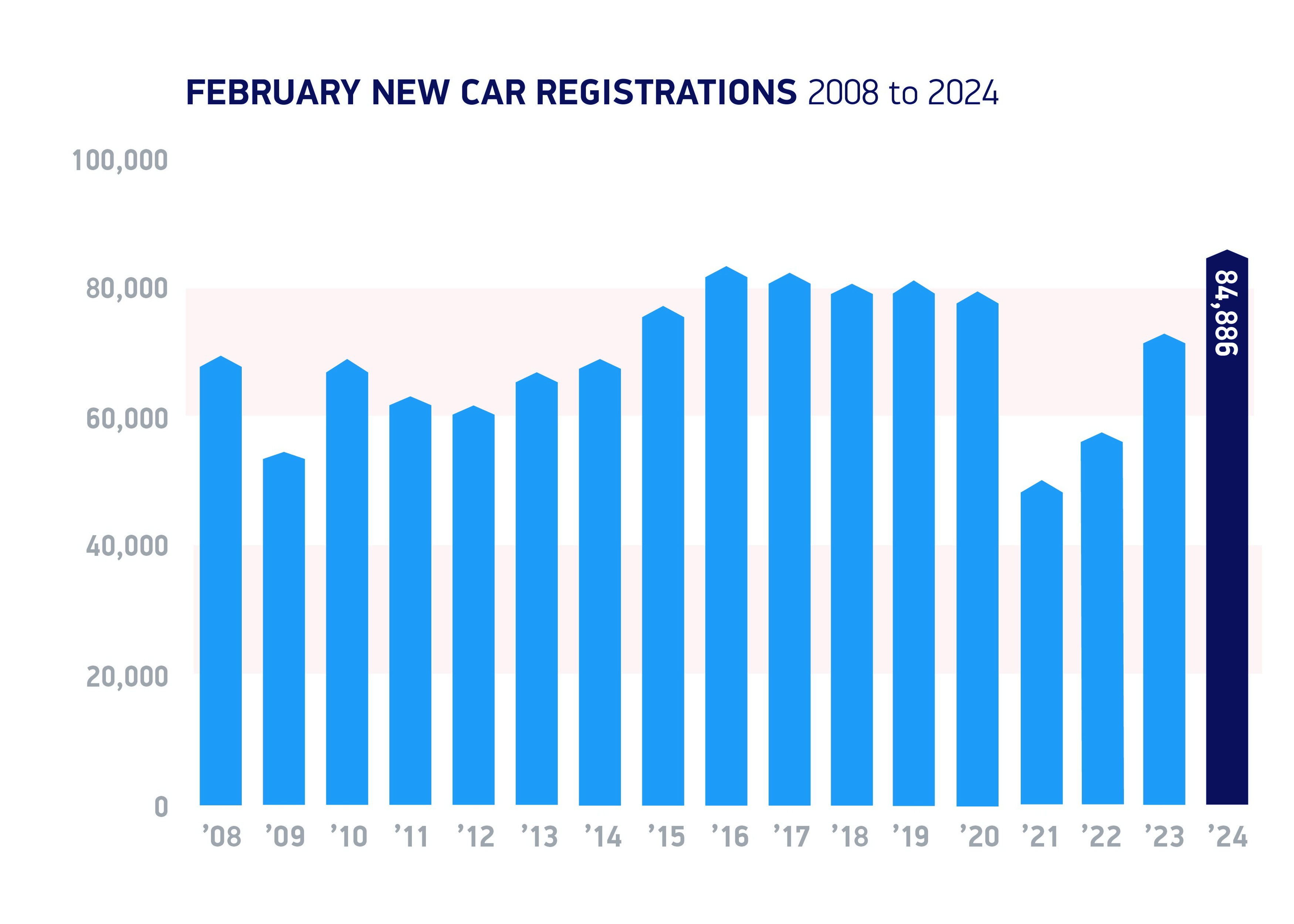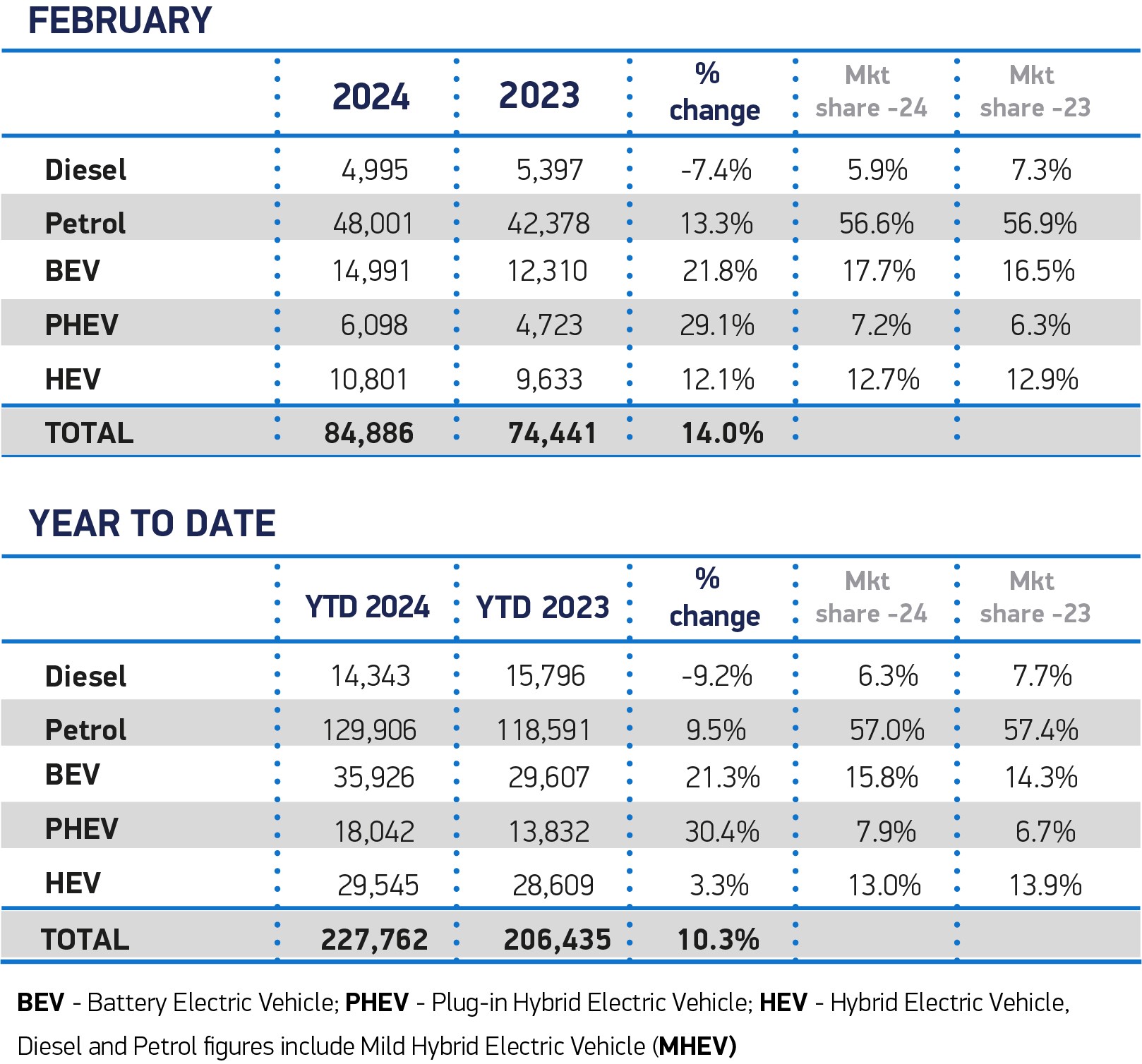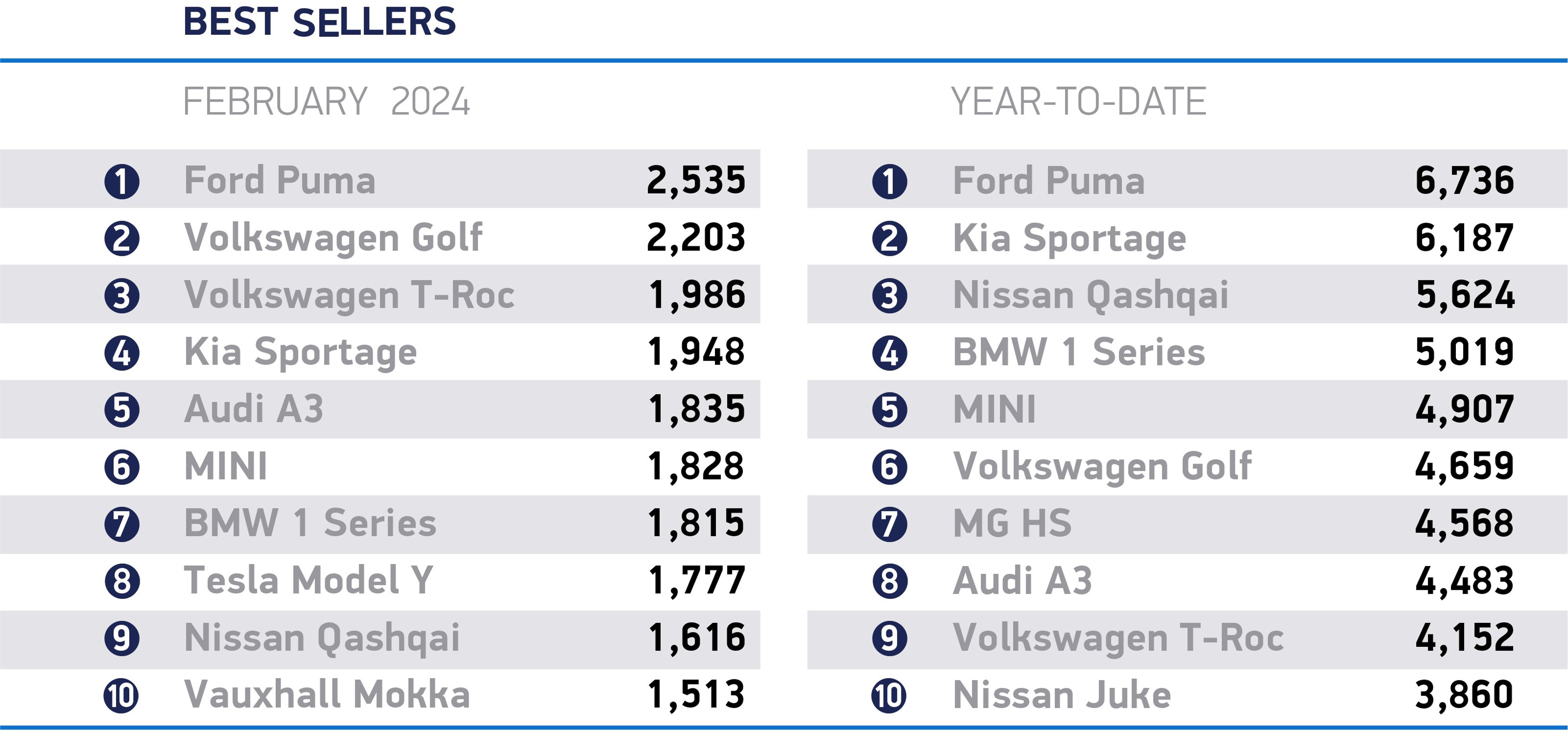Fleet registrations recorded double digit growth again in February, driving the UK’s new car market and battery electric vehicle (BEV) sales.
There were 56,266 new company cars registered to fleet and business in the month, a 25% uplift on the 45,050 units registered in February 2023, equating to 66% market share.
Year-to-date, fleet and business new car registrations stand at 148,888 units, equating to 65% of the market and a 27% increase on the 117,405 company cars registered during the same period last year.

Including private sales, the new figures from the Society of Motor Manufacturers and Traders (SMMT) show that the UK new car market has recorded its best February performance for two decades as registrations rose 14% to 84,886 units and was the 19th month of consecutive growth.
However, the entirety of February’s increase was down to fleet and business registrations, with private uptake down 2.6% compared to February 2023. Year-to-date private sales are down by a worrying 11.4%.

Electric vehicle new car registrations
Private car buyers have accounted for fewer than one in five (18.2%) new BEVs registered in 2024 so far, according to the SMMT.
While BEV market share and volumes continue to grow during the first year of mandated targets for manufacturers, the increase in uptake is entirely sustained by fleets.

Electrified vehicles recorded robust growth in February, with hybrid electric vehicles (HEVs) rising 12.1%, but taking a marginally smaller year-on-year market share of 12.7%.
Plug-in hybrids (PHEVs) recorded the largest proportional growth for the month, rising 29.1% to reach 7.2% of the market.
BEV uptake similarly outpaced the rest of the market, rising 21.8% to account for 17.7% of registrations, an improvement on last year’s 16.5%.
However, while the SMMT says that February’s growth is positive and demonstrative of ongoing robust demand for the latest vehicles, the long-term picture will become clearer in March, the busiest market month.
It wants the Chancellor to use the Budget tomorrow (Wednesday, March 6) to stimulate BEV demand by halving VAT on new EVs for three years, amending proposed Vehicle Excise Duty (VED) changes, and reducing VAT on public charging in line with home charging.
Mike Hawes, SMMT Chief Executive, said: “The new car market’s ability to deliver growth continues with its best February for 20 years and this week’s Budget is an opportunity to ensure that growth is greener.
“Tackling the triple tax barrier as the market embarks on its busiest month of the year would boost EV demand, cutting carbon emissions and energising the economy.
“It will deliver a faster and fairer zero emission transition, putting Britain’s EV ambition back in the fast lane.”
While consumers do not pay VAT on other emission reduction technologies such as heat pumps and solar panels, private EV buyers pay the full 20% levied on all cars, whether they be electric, petrol or diesel.
Halving VAT on new EV purchases would save the average buyer around £4,000 off the upfront purchase price – yet cost the Treasury less than the Plug-in Car Grant that was scrapped in 2022, says SMMT.
Similarly, it argues that upcoming changes to Vehicle Excise Duty next year would see the majority of BEV buyers effectively penalised £1,950 for going electric due to the ‘expensive car’ supplement.
Furthermore, those unable to charge a BEV at home currently pay a ‘pavement penalty’ of 20% VAT on public charging – quadruple the rate paid by those with the opportunity to charge at home.
Jon Lawes, managing director at Novuna Vehicle Solutions, said: “High prices are stalling EV sales to consumers and threaten to delay the transition.
“Without fresh EV support in the Budget this week, trade restrictions will be a difficult sell to consumers.”
Richard Peberdy, UK Head of Automotive for KPMG, added: “While the used EV market is growing, sales growth of new EVs to consumers has plateaued.
“Many in the car industry are looking to this week’s Budget and hoping that demand can be stimulated by the likes of cutting VAT on EV purchasing and at public charge points.
“Increasing EV sales is now all the more important after the Zero Emission Vehicle Mandate began this year.”
Jamie Hamilton, automotive partner and head of electric vehicles at Deloitte, highlighted how some manufacturers are starting to lag behind their zero emission vehicle (ZEV) targets, which requires at least 22% of new cars to be zero-emission in 2024.
“To sustain growth in the market there needs to be a holistic approach to incentives for new and used cars, as well as charging infrastructure," he said.
“Our surveys show the lack of charging infrastructure and affordability of new EVs remain the top concerns for consumers – with 71% expecting to spend less than £30,000 for a new or used EV.
“We should be seeing a wider and more affordable range of EV models coming to the UK market in the year ahead, including those offered by new brands which should help drive growth in the sector.”
Kim Royds, mobility director at Centrica, believes that unlocking access to kerbside charging for drivers who don’t have a driveway and are being ruled out from affordable charging rates must be a top priority.
"Industry leaders and policymakers must work together to promote streetside solutions that help to reduce the risk of charging inequality and give households the ability to confidently purchase an EV,” she said.
New AutoMotive says that 18% of all new cars sold in February were electric, according to analysis of separate data from the Driver and Vehicle Licensing Agency (DVLA).
It suggests that more than 14,000 electric vehicles (EVs) were purchased in the UK in the second month of 2024. Year-on-year EV sales grew by 28% in February.
Ben Nelmes, New AutoMotive’s chief executive, said: “Ministers now need to focus on making sure that as many people as possible are able to go electric by improving charging infrastructure and taking action to reduce the cost of electricity.”
James Court, chief executive of EVA England, added: “Previous purchasing incentives for EVs have been crucial to this drive, and tomorrow’s spring Budget is an excellent opportunity for the Government to reaffirm its commitment to EVs as the future of green mobility.”






















Login to comment
Comments
No comments have been made yet.